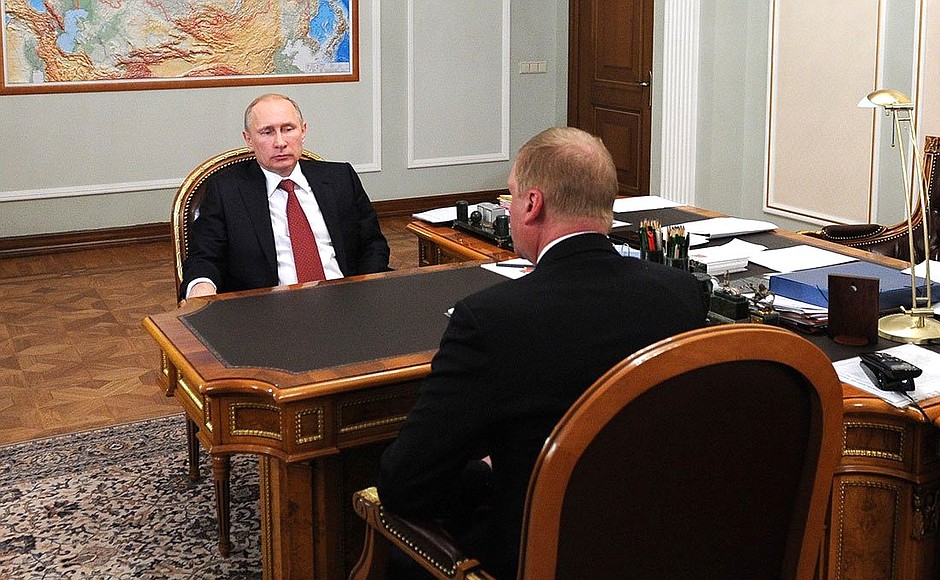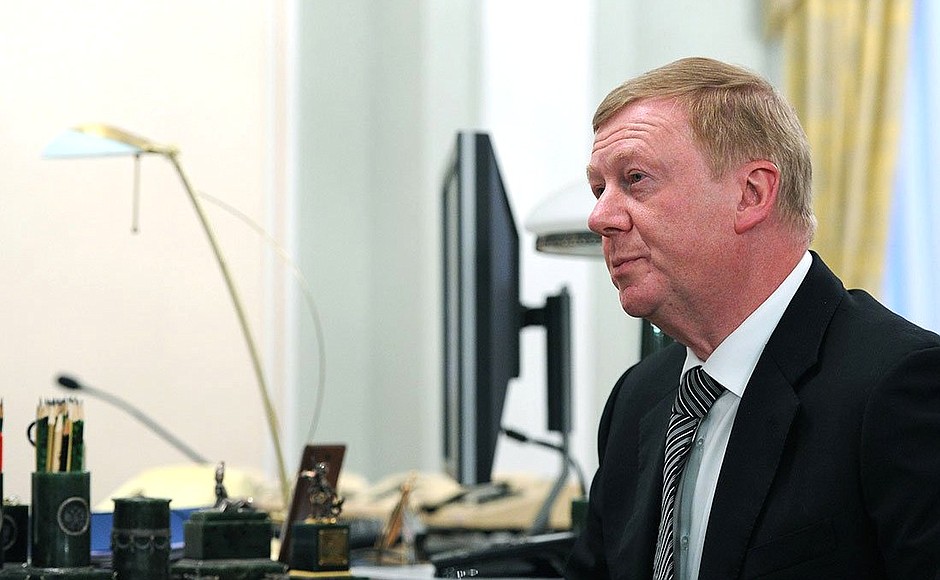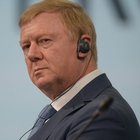* * *
President of Russia Vladimir Putin: Good afternoon. I remember my promise to meet at one of the company facilities. Let us begin our conversation at the office. However, we will definitely do everything we have planned.
chairman of the Executive Board of the Russian Corporation of Nanotechnologies (Rusnano) Anatoly Chubais: Will we manage?
Vladimir Putin: Of course. I would like you to tell me now about the company’s performance results for the last year and about your short-term plans.
Anatoly Chubais: We are now summing up the results for 2014 and for the entire project since 2007. We can see some positive results and things we did not do so well.
Overall, our main indicator is the production volume of the Russian nano-industry. The planned figure for the year was 100 billion. We are definitely on target, possibly even significantly exceeding it. Here everything is fine, just as it is with commissioning new facilities. We have built 57 plants and R&D centres across the country, 14 of them practically in the middle of nowhere, completely new facilities that are gradually picking up speed.
Vladimir Putin: In what regions?
Anatoly Chubais: In 21 regions. Moscow and Moscow Region are the leaders. Tatarstan is moving ahead very well, along with Kaluga. St Petersburg is falling behind somewhat, though there is certain progress there as well. There are some regions that may seem quite unexpected, like Mordovia, which is one of our leaders, and now Samara is also likely to become one.
Vladimir Putin: Do you have anything in the Far East?
Anatoly Chubais: Yes, of course, we do have something in the Far East. We have interesting projects in Primorye Territory as well, though I cannot say those are our leading regions. They have about two-three, maybe even one project per region, while the regions I named have built 5–7 plants over the same period.
Vladimir Putin: Nevertheless, I would like you to take a better look at the Far East.
Anatoly Chubais: I see.
Another important result is the implementation of our new strategy. We have reorganised the company and adopted a new strategy early last year, which now features a new indicator – the volume of external capital flow into investment funds, which are actually our source of funding for the Russian nano-industry. This was not easy for us and required a lot of preparatory work. We expected to set up a joint fund with the European Bank for Reconstruction and Development. The negotiations went on for about two and a half years and, obviously, led to nothing. The EBRD turned down the project because of the sanctions. Nevertheless, we found partners – in China – who set up a fund of a similar size that we could rely on, and they attracted over 7 billion rubles last year, just as we planned.
Moreover, it is becoming obvious that we are getting new partners in Asia, in South Korea, in Taiwan; we are also counting on Japan and a number of Chinese projects. Overall, it seems that this area has great resources in terms of investors into the things we are working on, and so far, we have only started tapping into them.
Vladimir Putin: We should not loose touch with other partners, regardless of any political limitations, we should at least maintain these contacts. Today, for instance, they cannot fully commit, though we all know that they would very much like to, but their hands are tied. We still need to maintain contacts with them at some level.
Anatoly Chubais: We keep our doors open.
Vladimir Putin: Of course.
Anatoly Chubais: This is completely in line with what we intend to do.
Some projects, unfortunately, failed. We had a rather well-known project to build a polysilicon plant in Irkutsk Region, which unfortunately we have not been able to implement due to the drop in polysilicon prices on the world market. In 2014 the project had to be closed down (fortunately, we managed to avoid bankruptcy). With the Governor’s support, we managed to find a partner who bought the fixed assets. He will redesign it all, but at least the building will be used some way. However, this is one of our failures, which do occur occasionally.
I find it very important that we are beginning to see projects of a social nature. Though most projects have to do with business, there is one we are proud of: the construction of nuclear medicine centres based on the use of positron emission tomography. This took a lot of effort, and with the support of the head of Bashkiria last spring in Ufa, in Bashkiria, we commissioned the first such centre, which is in great demand. They specialise in early and super-early diagnostics of cardio-vascular diseases. Super-early diagnostics actually means that we can cure those who in other situations would have been incurable. They have treated more than 2.5 thousand patients in six months and the results are very impressive. From diagnostics, they are now moving on to treatment using CyberKnife and other advanced technologies.
The main thing is that this will be the basis for launching a similar project in Bryansk in April; next will come Kaluga, Yekaterinburg and Lipetsk, I hope. From there we will move to Siberia, to Novosibirsk, and we plan to build a similar facility in Vladivostok. Actually there, the second stage of the project will be implemented jointly with Sergei Kiriyenko, with Rosatom. It will be built with the use of Russian equipment, which we then intend to launch into serial production. This project is of a social nature. I believe it benefits both our economy and society.
Vladimir Putin: Thank you.
<…>


